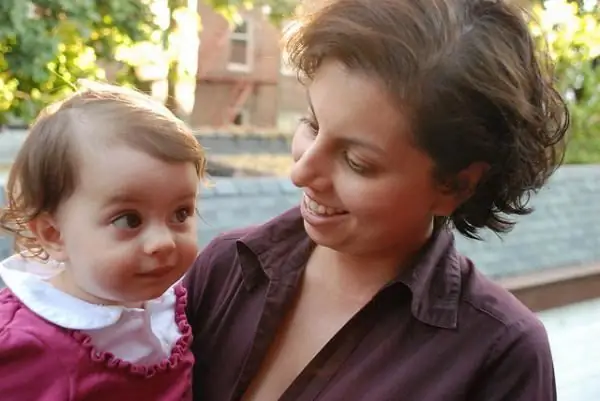2026 Author: Priscilla Miln | [email protected]. Last modified: 2025-01-22 17:55:19
Mothers are often very concerned about the situation when a neighbor's baby, the same age as their own child, is already pronouncing the first words with might and main, and not a sound is heard from his child. The situation is also heating up with doctors who, for some reason, are very fond of diagnosing "delayed speech development" to everyone who falls short of the standards adopted back in Soviet times.

In fact, all babies grow and learn differently, and if there are no obvious he alth problems, you should not worry that something is wrong with the child. Some children start walking early, others talk, others learn some other skills. It is better to focus your efforts on helping the baby pronounce his first words, and then sentences. But first things first.
When does a baby start talking? Official version
If you believe the already mentioned standards, then at the age of one year, the baby must have an active dictionary, consisting of at least five words. Toone and a half noticeably increases his passive speech, that is, his understanding of what adults are talking about. At two years old, a child should be able to build simple sentences. At a minimum, they should consist of two words. Well, at two and a half children are simply obliged to recite poems by heart.
By the age of three, a child should be able to decline nouns and conjugate verbs. At four and a half or five, he should have problems with the pronunciation of the sounds “r”, “l”.
Meanwhile, many experts note that recently these age norms are shifting, and not towards an earlier start of speech, but vice versa. There are many reasons for this.
When does a baby start talking? Factors influencing the development of speech
In many ways, when a child utters his first words depends on the other family members with whom he lives in the same house, especially his mother. So, live communication, frequent appeal to the baby, singing songs contribute to the acceleration of speech development.
A significant influence on the moment when the child begins to talk, have his older brothers and sisters. Often the younger children in the family are ahead of the older ones in the development, and this applies not only to the long-awaited first word. It's all about the additional motivation that appears in this case, because the baby has someone to look up to.

Sometimes parents, not knowing it, themselves postpone the long-awaited moment when it will be possible to conduct a dialogue with their beloved child. This happens if all the child's requests received inany form (stomping a foot, a gesture or a half-word) are performed immediately. In this case, the baby simply does not have an incentive to learn to speak correctly. Parents in this case should refuse this method of communication. The second example is when relatives, believing that the child is still quite small, communicate with him in “childish language”, even when his age is approaching the three-year mark. The words "bibika", "naka", "ava" and other similar words should forever leave the lexicon of adults, as soon as the baby is one and a half years old.
Another factor influencing when a child starts talking is his socialization. Today, many opponents of kindergartens have appeared, who believe that before school a child can be taught more at home. But even daily classes will not replace live communication with peers. Many parents admit that their two-year-old child, who had difficulty connecting two words, began to speak much more and more correctly when he went to kindergarten.
When a child starts talking: hereditary characteristics
All children are unique. And you don't have to look far for evidence. If you pay attention to peers swarming on the playground, you will notice that some do not get out of the sandbox, others cannot be dragged off the swing, and still others simply rush headlong the whole walk.
Same with speech. If one of the parents was uncommunicative and taciturn until the age of three, the baby may have the same developmental features. Of course, this situation is not at all necessary, but it is quite possible andunderstandable.

The child speaks badly: how to fix the situation
If a child lags behind the norm in speech development, the first thing to rule out is possible he alth problems. To begin with, you can simply watch the baby: whether he listens to the speech of adults and whether he understands it. Well, the second step is to consult a specialist.
If there are no visible reasons, you should devote more time to your child: read poetry, for example, Agnia Barto, attend general developmental classes for kids, play finger games and talk to him, not forcing him to pronounce new words, but causing a desire to do so do. And then he will definitely please you with his speech.
Recommended:
Transitional age in a child: when it starts, signs and symptoms, developmental features, tips

Yesterday you could not get enough of your child. And suddenly everything changed. The daughter or son began to throw tantrums, be rude and stubborn. The child became simply uncontrollable. What happened? Everything is very simple. Your bloodline has smoothly "driven" into a transitional age. This is a very difficult stage not only in the life of a small person, but also of his entire family. How many transitional ages do children have in their entire lives and how to survive this difficult period?
The most erogenous zone in women: concept, definition, structure of a woman, theory and practice of sexuality

Sexuality in men and women has a significant difference. The female intimate sphere is closely connected with the emotional components and therefore is multifaceted. A man who does not take this into account and does not try to understand, over time, can deprive himself of a woman's attraction
A 2-year-old child does not speak. What time do children start talking? When does the child say the first word?

What to do if a child does not speak at 2 years old? How to react to parents? Are there teaching methods aimed at developing speech? Which specialists to contact? Read about it in our article
How much should a newborn eat: theory and practice

How much a newborn should eat at a time and per day, whether he eats up and whether he has enough mother's milk alone - this, perhaps, is of most interest to young mothers, especially in the first days of their baby's life. How to find out for sure and are there any strict norms and standards at all?
Unicycle in theory and practice

Riding a unicycle can give avid cyclists a whole new experience and thrill. It is enough just to imagine what it is like to control something akin to an inverted pendulum, which gives a feeling of complete freedom

